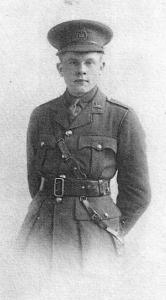
|

|
| Captain Wilfred Roderick POWELL | |
|
2/4th Battalion Dorset Regiment Date of birth: 14th May 1897 Date of death: 9th April 1918 Killed in action aged 20 Commemorated on the Jerusalem Memorial Panel 30 |

|
| Wilfred Roderick Powell was born at The Vicarage, Aberaman, Aberdare in South Wales on the 14th of May 1897 the son of the Reverend Morgan Powell BA, Vicar of Aberaman, and Edith Susanna (nee David) Powell later of Stoke Hill House, Limpley Stoke near Bath. He was educated at Lancing College where he was in Seconds House from May 1912 to July 1915. He served as a Lance Corporal in the Officer Training Corps and was a member of the Gymnasium IV in 1914. He had won a place at Oxford University, but instead he applied for a commission on the 1st of July 1915 in an application which was supported by the Reverend Bowlby, Headmaster of Lancing College. He volunteered for overseas service the same day at Dorchester. He had undergone a medical examination at Shoreham on the 27th of June at which it was recorded that he was five feet five inches tall. He was commissioned as a 2nd Lieutenant in the 3/4th Battalion Dorset Regiment on the 28th of July 1915. While in training he underwent an operation to remove internal semilunar cartilage from his right knee on the 17th of March 1916. He attended a Medical Board on the 24th of April 1916 at Mont Dore Military Hospital, Bournemouth which reported: - "The operation wound has healed. There is still considerable atrophy of the muscles of the right thigh and he complains of weakness. he was operated on March 17th 1916." A further Medical Board which sat at Woodley Camp at Romsey in Hampshire on the 13th of July 1916 reported that he had fully recovered. He was attached to the 2/4th Battalion of his regiment for war service which had been in India since 1914 and he left the UK to join them there. On the 15th of August 1917 the battalion embarked at Bombay on board the SS ”Multa”. They disembarked at Suez on the 29th of August and moved into camp at Kantara. On the 17th of September they entrained for the front in Palestine. There they saw action at the Battle of Gaza in the first week of November and the advance on Jerusalem which followed. They also saw action at the storming of Deir Ballut in March 1918. Once Deir Ballut had been taken on the 12th of March attention turned towards the high ground which ran parallel to Ballut Ridge, known as Three Bushes Hill. It was decided that this position, which was still occupied by the Turks, should be taken. With this in mind a patrol of the Dorsets was sent to reconnoitre the hill on the 15th but it was driven back by Turkish fire. Another probe on the 24th gathered more information and on the 27th a general advance was made to the base of the ridge. Early on the morning of the 9th of April the Dorsets moved forward to the attack with the intent of taking the hill. After a short, sharp fight they were established on top of the hill by between six and seven o’clock in the morning. D Company under Lieutenant Crick OL was holding the centre and right shoulder of the hill. The Turkish counter attack began at 7.45 and by 9 o’clock enemy pressure on the left flank held by B Company became such that A Company, who were in reserve, were called upon to assist. Twenty minutes later D Company reported their position as being “serious” with the enemy threatening their right flank. Personnel from Battalion Headquarters were rushed forward to reinforce them. Enemy shelling was heavy and it was at about this time that the Company Commander, Lieutenant Walter Haliburton Routledge Crick OL, was struck by a shell and killed. Wilfred Powell was killed on the hill later in the morning. The battalion clung on to its gains until the night of the 10th/11th of April when they were relieved by an Indian Regiment According to the battalion history:- “He died cheering on his men when they were hard pressed and the situation was looking critical.” His medals were sold at auction in London on the 25th of April 2012. |
|
| Seconds House |
Back